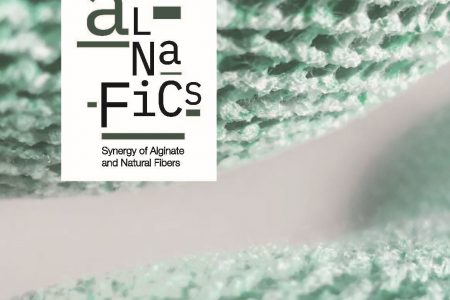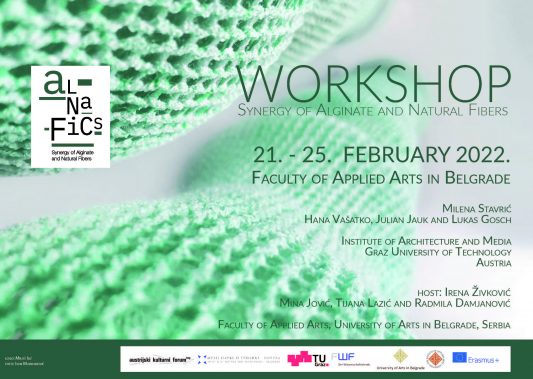
WORKSHOP & EXIBITION: Synergy of Alginate and Natural Fibers
AlNaFiCS
AlNaFiCS (Alginate Natural Fiber Composite Structure) workshop was held from 21.02. to 02/25/2022. at the Museum of Science and Technology in Belgrade. It was implemented through the cooperation of the Faculty of Applied Arts at the University of Arts in Belgrade (FPU) and the Faculty of Architecture at the Graz University of Technology (TU Graz).
The participants of the workshop were students of the Faculty of Applied Arts, University of Arts in Belgrade, Department of Industrial Design, Conservation and Restoration and Applied Sculpture, who attend subjects in the field of science and materials engineering within their study programs.
In this five-day workshop, students examined the possibilities of developing ecological biocomposite materials with an alginate matrix through a series of experiments, with the aim of merging materials engineering with architecture, applied arts, design, and conservation and restoration. By participating in the AlNaFiCS workshop, students were given the opportunity to expand their knowledge gained by attending subjects in the field of science and materials engineering and meeting the latest trends in the development of environmentally friendly products.
The alginate used is a natural polymer material obtained from microalgae and is completely environmentally friendly. Natural fibers based on cellulose (flax, hemp, dehydrated corn husk, cotton, wood pulp), protein (wool), mineral fibers (basalt), and metal wire (copper and galvanized low-carbon steel) were used as reinforcements. Students responded in large numbers and approached creatively and diligently the experimental work, which resulted in the following exhibits:
DUCTILITY wood pulp fibers, wood sawdust and dehydrated corn huskAnastasia Rubaković and Teodora Smiljanić·
SECOND CHANCE alginate fibers and basalt fiber mesh Anastasia Novković, Jovana Stoilović and Matija Obradović·
TRUNCATED ICOSAHEDRON LAMP alginate fibers and tin-coated low carbon steel wires Katarina Vračar, Andreja Nikić and Milica Vuković·
LAMP non-woven mineral structures, alginate and PLA parts obtained by 3D printing Petar Bozović, Djordje Stojković and Alicia Nadal Zuljević·
FOUR TYPES OF PROTEIN STRUCTURE alginate and galvanized low carbon steel wire Katarina Vračar
ТHE PROCESS OF CREATING wood pulp fibers, alginate, dehydrated corn husk Petar Božović, Đorđe Stojković, Ljubica Gavrilović, Jana Nikolić, Ana Ilić, and Alicia Nadal Žuljević·
EXPLORATION DAY alginate and cellulose substrate Petar Božović, Đorđe Stojković, Ljubica Gavrilović, Jana Nikolić, Ana Ilić, and Alicia Nadal Žuljević
LEVITATING BUBBLES alginate blisters Milena Zivković, Dunja Nenadović, Stefan Stanković and Ana Djordjević
ALGINATE SHEETS alginate with glycerol Dunja Nenadović
PILLOW hemp fibers felt, wood pulp fibers mesh and alginate Petar Bozović
ORGANIC PEARLS alginate with chitosan and copper wire Radmila Damjanović
COLONIZATION cellulose cotton fibers, wood pulp fibers and alginate Mina Jović and Tijana Lazić
The first samples of alginate matrix composites with cellulose fiber reinforcement in the form of dehydrated corn husk (possibility of using as packaging material) were also made, as were samples of alginate expansion (possibility of application as insulation material), samples of lamination of alginate matrix composites with reinforcement of cellulose fibers (flax) and probes for obtaining quasi-isotropic alginate matrix composites with protein fiber reinforcement (wool).
By combining the analytical approach of materials observation with experimental and hands-on work, students were able to learn new approaches and apply them directly in practice. developing a sense of the importance of using environmentally friendly biocomposite materials and their use in the near future.
Experimental works created during the workshop and posters documenting the work of students and descriptions of exhibits, from February 25, 2022, are exhibited at the Museum of Science and Technology in Belgrade and can be viewed until March 7, 2022.
The AlNaFiCS workshop and exhibition were supported by the Austrian Cultural Forum of the Austrian Embassy in Belgrade, the Museum of Science and Technology in Belgrade and the Erasmus+ program of the European Union.

![]()

